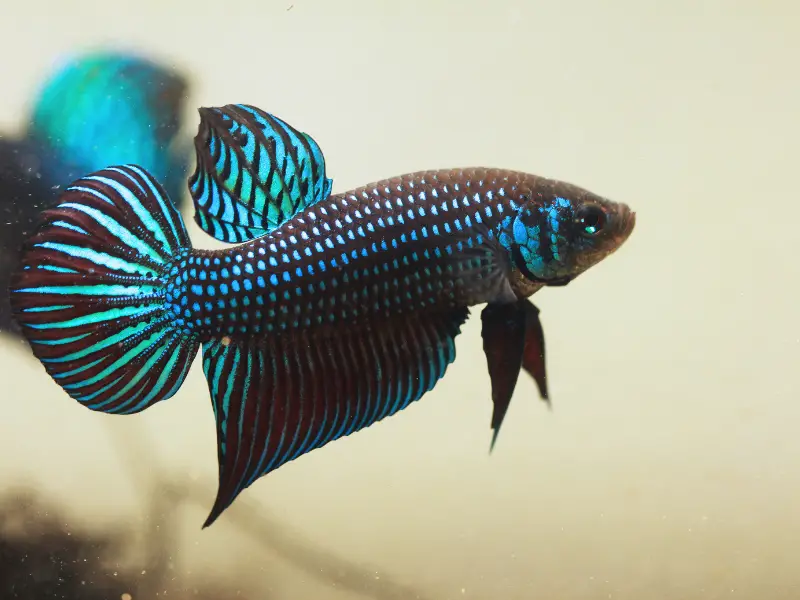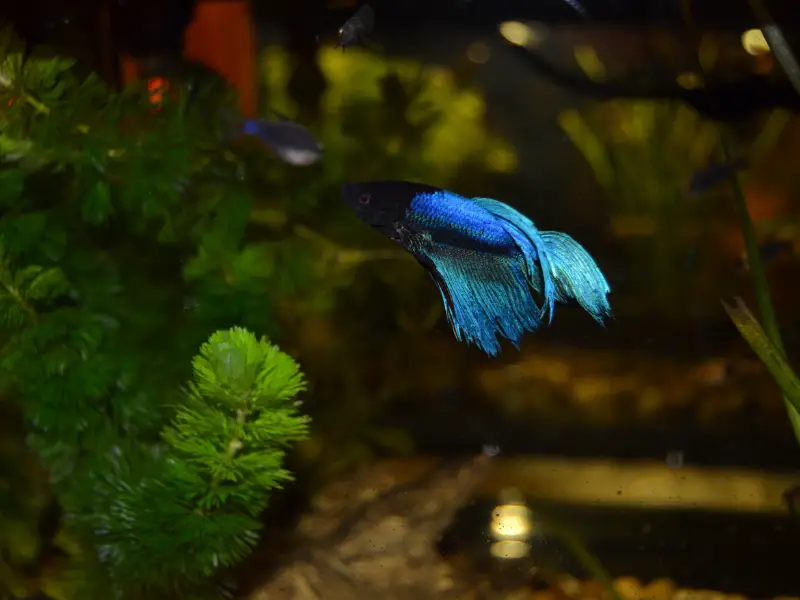Is your betta fish turning their nose up at every meal you offer? This can be a cause for concern, as a healthy appetite is crucial for your pet’s well-being.
There are several factors, like environmental stressors and illnesses, that could be affecting your betta’s appetite.
Addressing these issues is vital for ensuring a happy and healthy environment for your pet.
In this article, we’ll provide you with practical tips and tricks to address these issues and improve your betta’s appetite.
Why Is My Betta Fish Not Eating?

Poor diet, stress, inappropriate water temperature, and illnesses are just some of the reasons why your betta fish isn’t eating. In order to get your betta eating again, you must figure out what’s killing its appetite.
Stress
Bettas are sensitive creatures, and stress can be a major reason why your fish lacks appetite.
Various factors, such as sudden changes in their living environment or being moved to a new tank, can stress betta fish.
Identifying the cause and finding ways to reduce stress is essential for your fish’s well-being.
Poor Quality Food
Just like you wouldn’t want to chow down on a subpar meal, bettas can be turned off by low-quality food.
Ensure you’re providing them with a nutritious and diverse diet to keep their appetite healthy and consistent.
Disease
Illnesses can cause a loss of appetite in bettas. Monitor your fish closely for any signs of disease, such as lethargy, discolored scales, or fin damage.
If you suspect illness, consult an aquatic veterinarian for advice on treatment.
Water Quality
Poor water conditions are one of the most common reasons why bettas stop eating.
Maintain a clean tank by checking water parameters regularly and conducting water changes to ensure a healthy environment for your fish.
| Parameter | Ideal Range |
| Ammonia | 0 ppm |
| Nitrite | 0 ppm |
| Nitrate | < 20 ppm |
| Temperature | 76 – 80 °F |
| pH | 6.5 – 7.5 |
Picky Eater
Betta fish can be finicky eaters, and it’s not uncommon for them to turn their nose up at certain types of food.
If you’re having trouble getting your betta fish to eat, it’s important to experiment with different types of food to find what they prefer.
Freeze-dried, frozen, and live foods can be excellent options to try, as they provide variety and can entice even the pickiest eaters.
However, it’s important to ensure that the food you offer is nutritionally balanced and appropriate for your betta’s dietary needs.
Inappropriate Temperature
Betta fish are tropical fish and require a specific temperature range to stay healthy and active.
If the water temperature in the aquarium is too cold or too hot, it can cause a loss of appetite in your betta fish.
To ensure your betta fish stays healthy and happy, it’s important to maintain a consistent water temperature between 76-80°F (24.5-26.5°C).
A reliable aquarium heater, like this one sold on Amazon, can help regulate the water temperature and prevent fluctuations that can stress your betta fish and impact their appetite.
Overfeeding
Overfeeding your betta can result in a decreased appetite.
Aim to feed your fish the right amount by offering small, bite-sized portions twice a day – each roughly the size of their eye.
Remove any uneaten food to avoid water quality issues.
Competition
If you keep your betta fish in a community tank with other fish, competition for food can be a common issue.
Some tank mates may be more aggressive and outcompete your betta fish for food, which can lead to stress and a loss of appetite.
To ensure your betta fish gets an equal share of food, it’s important to monitor feedings and make sure they have access to adequate nutrition.
Separating aggressive tank mates can also help reduce stress and competition for food.
What To Do if Your Betta Fish Isn’t Eating?

A healthy appetite is crucial for the well-being of betta fish, so it can be concerning when they refuse to eat.
If you notice that your betta fish isn’t eating there are several things you can do to kick start their appetite.
Feed the Right Food
The first step is selecting the proper diet for your betta fish.
Make sure you are offering high-quality betta pellets, like these ones, as well as occasional treats like bloodworms or brine shrimp.
Be cautious with frozen or freeze-dried foods, as some bettas won’t eat until it’s thawed properly.
If your betta is still not eating, try different types and combinations of food.
Check Water Parameters
The quality of the water in your tank is critical for your betta’s health.
Test the water chemistry, including the pH and ammonia levels. Maintain the water temperature within the suitable range for bettas, typically between 78–80°F.
Correct any parameter imbalances slowly and cautiously, to avoid shocking your fish.
Reduce Competition in the Tank
In a community tank, some tank mates can be more aggressive when it comes to food.
This competition may prevent your betta from eating comfortably.
Observe the feeding habits of your fish, and if necessary, separate your betta during feeding time or consider housing them in their own tank.
Identify and Remove the Stressor from the Tank
Stress can be a significant factor in your betta’s loss of appetite.
Bettas are sensitive fish and react to various factors like sudden changes in water temperature, poor water quality, or bullying by other fish.
Observe your betta’s behavior and identify possible stressors.
Once identified, take appropriate actions to reduce or eliminate the stressor from your betta’s environment.
Take the Betta Fish to the Vet
If you did everything in your power to get your betta fish to eat and it still refuses to, you might be dealing with an underlying health issue.
Just like when any other pet is sick, it’s wise to consult a veterinarian specializing in aquatic animals and have them check your betta fish.
The vet will examine your fish and depending on the underlying health problem provide appropriate treatment or medication.
FAQs About Betta Fish Not Eating
How Long Can a Betta Fish Go Without Eating?
Betta fish can go up to two weeks without eating. However, it’s important to note that a lack of appetite for an extended period of time can be a sign of an underlying health issue or stress.
If your betta fish is not eating for more than a few days, it’s important to investigate the cause and take appropriate steps to address the issue.
Providing a variety of nutritious foods, maintaining good water quality, and reducing stress can all help encourage your betta fish to eat.
If you’re concerned about your betta fish’s appetite, it’s always best to consult with a veterinarian or experienced aquarium specialist for guidance.
Why Is My Betta Fish Barely Moving and Not Eating?
There could be a few reasons why your betta fish is not moving much and not eating.
Poor water quality, overcrowding, and incompatible tank mates can all contribute to stress and illness in betta fish
Additionally, a lack of appetite can be a symptom of several health issues, including swim bladder disease, parasites, and bacterial infections.
If you notice that your betta fish is barely moving and not eating, it’s important to investigate the cause and take appropriate steps to address the issue.
Consult with a veterinarian or experienced aquarium specialist for guidance on how to best care for your betta fish.
How Do I Know if My Betta Fish Is Starving?
A betta fish that is starving may exhibit a lack of appetite, lethargy, and a visible loss of body mass. They may also become weak and disinterested in their surroundings.
If you notice that your betta fish is not eating or appears to be losing weight, it’s important to investigate the cause and take appropriate steps to address the issue.
Providing a variety of nutritious foods, maintaining good water quality, and reducing stress can all help encourage your betta fish to eat.
Related Articles: